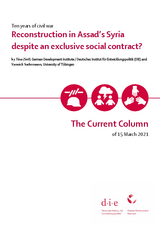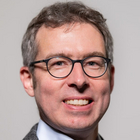Ten years of civil war
Reconstruction in Assad’s Syria despite an exclusive social contract?
Zintl,Tina / Yannick SudermannThe Current Column (2021)
German Development Institute / Deutsches Institut für Entwicklungspolitik (DIE), The Current Column of 15 March 2021
On 15 March 2011, people in the southern Syrian city of Deraa began to demonstrate peacefully against the Assad regime, which violently quelled the protests. This marked the beginning of the Syrian civil war, which has seen large swathes of the country destroyed over the last decade and neighbouring countries affected heavily by the high numbers of refugees. The ruling Assad camp is now considered to have secured the military victory, but around one third of Syrian territory still remains outside of its control. The economic and humanitarian situation continues to intensify due to rampant inflation and COVID-19. Some 90% of the population lives below the poverty line and, once again, people are taking to the streets in open protest against the regime. Syria’s original social contract, which had never been particularly just, imploded as a result of the civil war. Assad is exacerbating matters by opting for an ‘elite contract’ limited to loyalists and war profiteers, having successively removed state protection and public services for all other Syrians. In any case, political participation had never existed in the country. While the international community is grappling with the 2030 Agenda and how to leave no one behind, Syria’s regime excludes anyone who (allegedly) objects to its rule.
The most problematic issue for future reconstruction is the lack of protection for housing, land and property. The 2018 property law paves the way for expropriation and thus facilitates the practice of depriving ‘undesirable’ population groups of their rights. Only a tiny proportion of refugees carry valid identity documents or certificates of ownership with them. In fact, many individuals living in informal settlements never had such certificates to begin with, and yet having these documents is the only way for affected persons to assert ownership claims within the tight timeframe for filing an appeal. In this way, state reconstruction assistance is primarily linked to whether or not the affected parties are loyal to Assad, rather than to the extent of destruction suffered by a given neighbourhood. Entire districts, most of them former rebel strongholds, have since been demolished to make way for upscale housing.
The lack of state protection is also becoming especially evident in so-called ‘reconciliation agreements’ in recaptured areas as well as in the legal status of former fighters, both of which are dictated by the regime. Those who did not agree to the conditions were resettled to the Idlib region, which is now a final bastion of opposition fighters, in a move that is more a show of power by the state than an attempt at conflict resolution. After all, even valid reconciliation papers offer no protection; time and again, supposedly rehabilitated individuals are demonstrably restricted in their freedom of movement, jailed, tortured, forcibly recruited as fighters and murdered. Documents issued during the civil war, for instance by Islamic State (IS) or the Syrian Interim Government, are not being recognised by the Assad government and offer no legal guarantee of reintegration into the Syrian social contract.
Even many individuals who had never left Syria and belonged to the ‘right’ political camp play only a subordinate role in Assad’s Syria. The regime is financially and politically dependent on unreliable foreign partners and a handful of business tycoons – war profiteers that are well connected politically. Assad’s focus on well-funded stakeholders is a result of Syria’s strained finances. A decade of grotesque military spending, the destruction of productive infrastructure and the loss of key raw materials deposits have left a deep financial hole. From real estate and agricultural land to resource extraction and lease agreements for navy and air force bases, the Syrian regime is apparently selling the silverware in order to reward long-standing loyalists and allies.
This is putting Western governments in a dilemma. Urgently needed assistance for a destitute civil society is sometimes being siphoned off by organisations close to the regime. Thus, existing initiatives for rebuilding urban infrastructure could even cement Assad’s highly exclusive social contract, not least because the Syrian construction industry is dominated by Assad’s protégés.
Nonetheless, donors must keep attempting to reach those in need on all sides. It is precisely because of their limited influence that donors should coordinate their overall foreign policy efforts (diplomacy, cooperation, migration policy) closely and as consistently as possible. They need to keep track of which state services have already been dismantled and which societal groups are currently marginalised. Given power relations on the ground, donors should – in addition to humanitarian aid – initially implement social rather than physical reconstruction. Priority must be afforded to flexible, small-scale measures at local level that are geared to vulnerable groups and promote social cohesion. The international community needs to evaluate and monitor on an ongoing basis the impact of its actions in order to facilitate or at least avoid counteracting an inclusive social contract. In case of doubt and even for projects already under way, the relevant actors must have the courage to adopt a ‘take it or leave it’ approach.
Tina Zintl is Senior Researcher in the Programme "Transformation of Economic and Social Systems" at the German Development Institute / Deutsches Institut für Entwicklungszusammenarbeit (DIE). Her work focuses on state-society relations under authoritarian rule as well as employment promotion and digitalization (‘future of work’) in the Middle East/North Africa (MENA).
In his research, Yannick Sudermann (Human Geographer) focuses on urban development and social inequality in Syria. Until recently he worked at the University of Tuebingen, Germany, on institutional discrimination against refugees at German schools.



